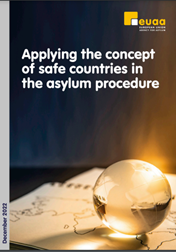3.3.2. Safe country concepts
As part of the European Commission’s pilot project, Bulgaria started working toward the adoption of two lists with designated safe countries of origin and safe third countries.367
Changes to the national lists of safe countries of origin took place in Belgium, which removed Georgia,368and in Denmark, which removed Russia369from their lists. In Czechia, Ukraine and exceptions for Abkhazia, South Ossetia and Transnistria were removed from the list, while Armenia, the United Kingdom and the whole of Georgia and Moldova were added as safe countries.370
Greece proceeded with an annual review but concluded that no changes were needed.371 However, in the framework of a request for an annulment of the provisions designating Türkiye as a safe third country,372the Greek Council of State referred questions to the CJEU for a preliminary ruling. Greek national courts rejected the presumption of Türkiye as a safe third country for several individual cases throughout 2023.373
In Germany, Georgia and Moldova were added to the list of safe countries of origin. The reasoning of the draft underlined that the recognition rate for both countries was below 0.1% in 2022 and the first half of 2023, and over 10% of all rejected applicants came from these countries.374
For a full overview of EU+ countries which implement the concepts of safe country of origin, safe third country and European safe third country, please consult the Who is Who in International Protection in the EU+: Countries Applying the Concept of Safe Countries in the Asylum Procedure – interactive data visualisation and report.

Italy added Côte d’Ivoire, Georgia, Nigeria and The Gambia to the list of safe third countries by Decree of 17 March 2023.375The Association for Juridical Studies on Immigration (ASGI) expressed concerns about the designation of Nigeria, underlining that the recognition rate amounted to 41% based on data for January-September 2022.376Tunisia remained on the list and a joint declaration by civil society organisations drew attention to their findings on the increased repression of political opponents, civil society organisations and minorities in the country.377In individual cases, the tribunals in Catania and Florence found that Tunisia could not be considered as safe based on updated COI.
The Dutch IND examined whether several countries can be considered safe third countries. In January 2023, the IND considered that Colombia in general cannot be regarded as a safe third country due to the combination of a weak asylum system and the fact that the rights of asylum seekers and recognised refugees cannot be sufficiently guaranteed in practice.378In March 2023, the IND concluded that Mauritania can be regarded as a safe third country, given that the country has a functional asylum system, no cases of refoulement had been reported in recent years, and asylum seekers and refugees have the right to work and the same rights to social services, education and healthcare as Mauritanian citizens.379In October 2023, the IND decided that Djibouti can be regarded as a safe third country by concluding that there is access to the asylum procedure, where UNHCR acts as an observer in the processing of applications, and rights of access to education and healthcare are provided.380
- 367European Commission. (2023, October 18). Commission reports on progress made by Bulgaria and Romania on the Pilot Projects for Fast Asylum and Return Procedures [Press release].
- 368Arrêté royal du 7 avril 2023 portant exécution de l'article 57/6/1, § 3, alinéa 4, de la loi du 15 décembre 1980 sur l'accès au territoire, le séjour, l'établissement et l'éloignement des étrangers, établissant la liste des pays d'origine sûrs [Royal decree of 7 April 2023, implementing article 57/6/1(3) 4) of the Law of 15 December 1980 on access to the territory, residence, settlement and removal of foreigners, establishing a list of safe countries of origin], April 7, 2023.
- 369Danish Immigration Service | Udlændingestyrelsen. (2023, January 19). Russia is no longer on the list of safe countries.
- 370Vyhláška č. 289/2023 Sb., kterou se mění vyhláška č. 328/2015 Sb., kterou se provádí zákon o azylu a zákon o dočasné ochraně cizinců, ve znění vyhlášky č. 68/2019 Sb. [Decree No 289/2023 Coll. amending Decree No 328/2015 Coll. implementing the Act on Asylum and the Act on Temporary Protection of Foreigners, as amended by Decree No 68/2019 Coll.]
- 371Υπ. Απόφαση 527235/2023 [Ministerial Decision 527235/2023].(2023, December 1).
- 372See European Union Agency for Asylum. (2023). Asylum Report 2023.
- 373See for example: Greece, Independent Appeal Committee, Applicant v Regional Asylum Office of Lesbos, No 300763/2023, 12 June 2023.
- 374Federal Ministry of the Interior and Community | Bundesministerium des Innern und für Heimat. (2023, August 30). Entwurf eines Gesetzes zur Bestimmung Georgiens und der Republik Moldau als sichere Herkunftsstaaten [Draft law designating Georgia and the Republic of Moldova as safe countries of origin] [Press release].
- 375Decreto 17 marzo 2023 Aggiornamento periodico della lista dei Paesi di origine sicuri per i richiedenti protezione internazionale [Decree 17 March 2023 Periodic updating of the list of safe countries of origin for applicants for international protection]. (17 March 2023).
- 376Godio, G. (2023, May 20). La Nigeria Paese d’origine sicuro? “Una politicizzazione del diritto” [Is Nigeria a safe country of origin? “A politicization of law”]. Vie Di Fuga - Osservatorio Permanente Sui Rifugiati.
- 377Associazione per gli studi giuridici sull'immigrazione. (2023, April 17). La Tunisia non è né un paese di origine sicuro né un luogo sicuro di sbarco per le persone soccorse in mare [Tunisia is neither a safe country of origin nor a safe place of disembarkation for people rescued at sea].
- 378Immigration and Naturalisation Service | Immigratie- en Naturalisatiedienst. (2023, January 13). Beoordeling veilige derde landen Colombia [Safe third country assessment Colombia].
- 379Immigration and Naturalisation Service | Immigratie- en Naturalisatiedienst. (2023, March 1). Beoordeling veilige derde landen - Mauritanië [Safe third country assessment - Mauritania].
- 380Immigration and Naturalisation Service | Immigratie- en Naturalisatiedienst. (2023, October 13). Djibouti: beoordeling Veilig Derde Land [Djibouti: safe third country assessment].

